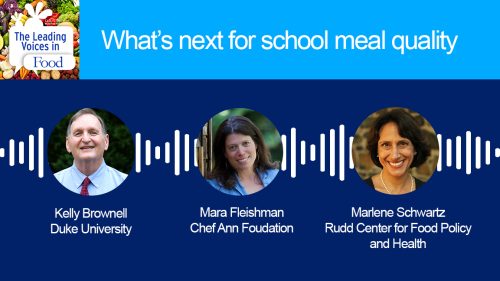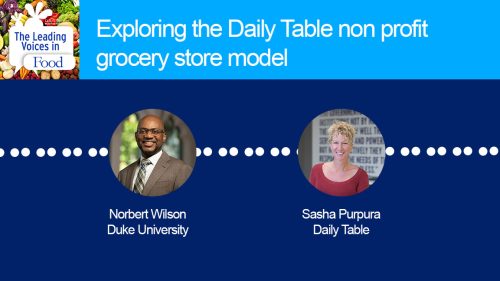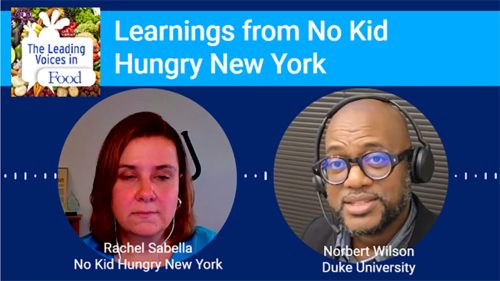The Leading Voices in Food
E172: The Power & Potential of Co-ops for Economic Development Through Food
Today, we’re talking to a change management leader, a person who is advancing social justice through food co-ops. Darnell Adams co-leads Firebrand Cooperative, a new consultancy helping nonprofits, cooperatives, and other socially responsible organizations throughout the US. In a recent article, she wrote for “Nonprofit Quarterly” that a food co-op isn’t a luxury item, but the lifeblood of their communities.
Subscribe: Apple Podcasts | TuneIN | YouTube Music | SoundCloud | PocketCasts | Radio Public
Tags: Community & Economic Development | Equity, Race & Food Justice |

Darnell Adams, of Firebrand Cooperative, is a dynamic leadership coach, facilitator and business strategist, who has over two decades of experience working with nonprofit, for profit and cooperative businesses. She has been personally recognized in “Bold Thinkers Who Are Shaping Our City” by Boston Magazine’s Power of Ideas and as a Social Innovator by the Social Innovation Forum accelerator program. She develops and facilitates strategic plans, special projects, and workshops, providing expertise and training on an array of topics including implicit bias, power and equity. Darnell has presented to government officials, university administrators, and industry leaders to create social and economic change. Darnell has a Master of Education from Harvard University and is a Certified Leadership Coach.
Interview Summary
So let’s jump right in. You’ve written that a new wave of leaders is organizing in communities, Black communities, Latinx, Indigenous, rural, immigrant communities, and communities lacking in wealth overall. How have your experiences led your work in supporting economic development through food?
Yeah, it’s such an interesting journey I’ve been on. So I’m going to step back just a minute to say how I landed in the places that I’ve started to work. Certainly my interest in food is shaped by my experience in the world and my childhood experiences. My mother, who is an immigrant, my father, who’s an immigrant – their relation to food and the African diaspora. I grew up understanding what food meant in terms of identity, in terms of nutrition, etc. So I had my own thoughts about food certainly from those experiences, and also had my own business as a caterer for many years. I had that understanding of what it means to be a small business, and launching a business and all of the trials and tribulations of doing that. And in the process of running that business I came to find a location where I could situate that business in a way that was affordable to me using a shared kitchen space that was located in Boston, Massachusetts. Then I really started to develop a broader understanding of some of the economic considerations, not just mine, but many of the producers were having in terms of how to run a viable business, and what supports were needed or missing in their experiences. It’s kind of a long story and I won’t get into it how it happened, but it so happened that at a certain point, I began a new career as managing director of that shared space kitchen. That was a whole leap in terms of thinking about not just my small catering business, but supporting many businesses, whether they be food trucks, caterers, producers of something that was a shelf staple product or something like that. Many of those business owners were immigrants, many were women or otherwise not having the amount of capital to be able to just open up their own spaces.
Tell us a little bit more, if you would, about the kitchen itself and what kind of work it did?
Oh, sure. So the kitchen, and there are now several across the country, but at that time, there were very few of them. It was a shared space that was initially run by a CDFI – a community development funding institution – who was able to obtain funding to open up a kitchen space knowing that there were many people who wanted to run food businesses, or start a food business, but were unable to because of the cost of actually renting out a space. They needed space to use and that would be inspected by inspectional services and given the green light to work and sell their products. So the kitchen did actually aid some caterers and other people who were working underground in their own houses, not being certified, etc., and therefore not able to expand their business. The idea of shared kitchens is really, really important. Certainly it was the way that I was able to launch my business and able to run it for some years because it was affordable to me. And at that one location was able to grow the business and actually move the location to a bigger space. I have a really long story there, but it’s CommonWealth Kitchen in Boston and it is still thriving. They were able to actually buy the building recently, and the space that is still producing quite a lot of businesses that are thriving and also moving into their own spaces. The kitchen is able to give the support, not only just the physical space, but the technical assistance that’s necessary to launch a business, to have a business thrive, and then maybe that businesses can move on to have their own spaces. This is really important in terms of thinking about the whole ecosystem of what I would say the food system needs in many communities. But also in terms of what individually someone might actually need in terms of being able to thrive in the food business.
Well, you can see how this would be so powerful as a means of helping people get launched. And a topic that we could talk about another day might be how can these things be put in more places with more support so more people, their businesses could be facilitated by it. But let me turn our attention to the issue of food sovereignty. So I know you’ve done a lot of thinking about food sovereignty, especially in Black communities. What sort of efforts are you seeing?
Yes, this actually leads me to cooperatives as one of the kind of efforts that I’m seeing in Black communities. And, if we kind of would follow the storyline, in some ways in my experience. The shared kitchen really did open my eyes to the power of collective resources, that no one person in that kitchen was able to afford having their own facility, but together, along with supportive fundraisers, etc., who are able to have a place that was actually thriving and meeting needs. And so upon me leaving that job, I was really kind of struck with what are other ways in which people are creatively thinking about collective capital and all the ways capital can be defined. And there was an opportunity with a food co-op in Boston, the Dorchester Food Co-op that was looking for a project manager to administer some of deliverables for a grant that they had. That was my entrance into the cooperative world, and realized that cooperative economics, an understanding of what people were doing in developing a co-op and all the things that it took, actually really very much aligned with my experience in general. And my philosophy in terms of how people have more entryways, more opportunities to actually take control and ownership of their own economic development. So it’s not always groups from the outside looking at a community and then saying, well, we know how funds should be applied or how businesses should be created. Instead, particularly in a cooperative movement, it’s the community themselves are saying, we understand exactly what we need in terms of goods and services. We actually will define for ourselves both what leadership looks like and what ownership looks like. So in terms of food sovereignty movement in Black communities and others as well, this incredible growth in terms of thinking – let’s look at what joint ownership looks like as a different way to create sovereignty and to keep money in a community. But also money in working in the ways that are consistent with our needs. So certainly food co-ops. Lots of work around land loss, Black land loss for farmers, and creating land trusts. Again, this idea, while not cooperative, is still looking at kind of a collective way of ownership that keeps land off the speculative market. Also just supporting the farmers that are there, both in rural areas and in urban farming. So there is kind of a whole landscape where people are really thinking very deeply and working very hard on all the aspects of food sovereignty, from growing to shopping to workers.
So can you explain some of the opportunities that get created through these kind of efforts and how these opportunities help create social justice?
Yes. This is what’s so incredibly exciting and certainly keeps me motivated to work with the folks that I’m working with. The opportunities are pretty broad. And I kind of mentioned a few of these before in terms of thinking about what ownership looks like in a very different way, in which kind of the language of ownership sometimes can get overused. And if you kind of dig deeper, it’s not real ownership. So for instance, in terms of food cooperatives, the business is actually owned via shares by its members. In which case, for food co-op, typically that is the community members who are buying a share of the business. Not like being an owner of a quote unquote, a member of a big box store, where you get some money back and you say, okay, well, I’m a member of this club, but you have no ownership. There’s no share that is given to you. You’re not a shareholder. In the case of cooperatives, certainly you are. And so really kind of rethinking about, like, well, it’s not that for goods and services that are might be absent in a community that we need to wait for another entity to come and offer to us what they have, and it may or may not be a match for what we actually really need. But as owners, the folks who are actually going to benefit from the existence of the business, from the profits of the business, by the goods and services that are being delivered, that ownership really does take a whole different sort of meaning that a lot of people are accustomed to. And then there’s also the opportunity for leadership also in ways that I think are certainly opportunities that many people may not have had before, and I can certainly speak from my experience that as the project manager of the cooperative, that stepping into that role required leadership and vision in ways that I had not encountered before when I was working for another entity, and I was staff doing what I needed to do, but because it’s a grassroots effort, because the systems and the processes, all of that are things that are kind of created by the entity, it meant all the ways to experience all sorts of different levels of leadership and consideration that in many cases would not be something that people would experience.
Right, so, I mean, you’re painting a really wonderful picture of how many people in a community can play different roles and develop leadership abilities that are possible through these, so those are some of the opportunities. What are some of the challenges, and what do you think such groups need most?
Right – I’m certainly, you probably can tell by my description of things, very much enthusiastic about the opportunities and the vision for many of these efforts. Particularly the food cooperatives that are happening all across the country in Black communities, and the challenges are also real. So some of that is certainly capital, and I can kind of outline a bit on some of the struggles there and the ways that it can be deployed that would be helpful to some of these organizations. So in terms of capital, one thing is really on some basic level, kind of unknowing in many ways from where groups who might be able to provide capital and even understanding what a cooperative is and how it works. So it’s kind of the general idea that, well, cooperatives are out there. I think maybe they sell granola and things, but beyond that, not a kind of deeper understanding of kind of inner workings of a cooperative and how their money might actually be aligned to other social justice issues that they might be funding. So it’s like just the awareness and saying, okay, well, this seems to make sense in terms of, yes, if I’m thinking more about nutrition, about any number of things, but say nutrition, food access, economic development, having a better and more refined understanding of what cooperatives offer might actually kind of bridge that gap between the funders and what’s needed in order to create a cooperative. Secondly is the amount of time it takes to develop a cooperative, which can be years. It definitely requires a lot of people taking a lot of time that is often voluntary, but can also kind of stretch them out of time that it takes for people to develop these co-ops in their communities because they’re trying to fit it in amongst all the other things that they’re trying to do in their lives. They’re not paid for it necessarily, so I think a certain amount of funding, even just for a paid project manager to kind of move forward what is a complicated business, to kind of shorten the length of time so the delivery of goods and services can happen in a more rapid fashion to actually address some of the issues that we’re seeing in Black communities. So that is a couple things there, which is the time it kind of can take, and also lack of capital resources that some of these groups have, and then trying to certainly work around that.






